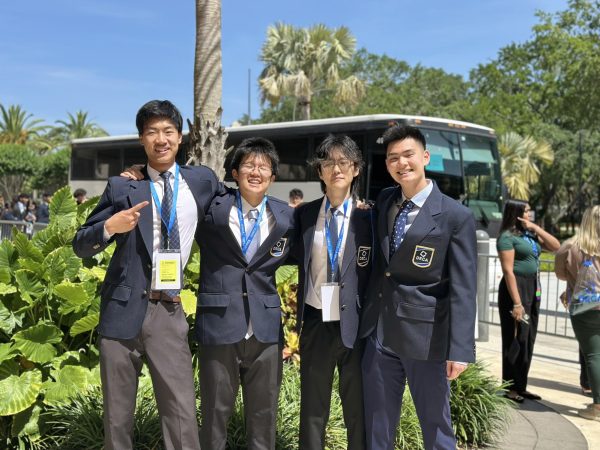Around the globe with world language teachers
Spanish teacher Mr. Jason Colchao poses by the Andes Mountains of Machu Picchu, Peru.
Three of RM’s world language teachers came to us from their home countries, ranging from beautiful islands to dazzling architectural cities.
Spanish teacher Ms. Nilma Maria Martin Antonetti described her experiences growing up in Puerto Rico.
“My favorite memory was [the fact that] we didn’t have cell phones. We had to go and get together with our friends if we wanted to talk to them,” she said.
Life in the teachers’ home countries can be very different from life in America.
“The thing that is different from the United States is that we walked everywhere,” Spanish teacher Ms. Carmen Gonzalez-Pescador said, who is from Spain. “I remember having a lot of freedom.”
Some of RM’s world language teachers came to the U.S. due to a variety of reasons.
“I wanted to spend a whole year, not only the summer. I wanted to experience all the seasons and holidays,” Ms. Gonzalez said.
The teachers had a wide range of experiences as they transitioned between their home country and the US.
“The biggest struggle is learning English because it is a very difficult language to learn,” Ms. Antonetti said. “You have like twenty-something vowels. We only have five. Even today, I have a hard time pronouncing some things.”
Ms. Antonetti came as an exchange student. She lived in New York, Los Angeles and San Francisco before finally settling in Maryland.

Other teachers experienced less of a language barrier.
“[The US] has a different society, but I spoke English already. So I didn’t have to struggle,” Mr. Gerard Giblin said, who is from Nice, France.
The teachers described the aspects they prefer about the U.S. that cannot be found in their home nations. Ms. Antonetti mentioned how in Puerto Rico, the space was limited because Puerto Rico is smaller than the size of Maryland alone.
Ms. Gonzalez has also found activities she prefers in the United States than in Spain.
“Shopping here is amazing, because you have sales all the time. Also, people in general are nice and welcoming, especially in this area,” Ms. Gonzalez said.
Although these teachers have found many elements they enjoy about the US, the teachers miss features that are unique to their country. Mr. Giblin and Ms. Gonzalez both described missing the food in their home country, while Ms. Antonetti misses the weather.
Unlike Ms. Gonzalez, Ms. Antonetti prefers shopping in Puerto Rico over in America.
“I love going shopping there because it takes you… hours. You have to stop and talk to people, everybody knows you,” she said.
Ms. Gonzalez mentioned that she still struggles with navigation in the US, and often has to ask others for help.
“There is always something that reminds you that you are not from here… So it is home, but it’s not your country.” Ms. Gonzalez said.
Learning English as a second language had a substantial impact on the teachers. “[English] made me realize how important is to know more than one language,” Ms. Antonetti said. “Unfortunately, because the United States is so large, we don’t have the need to know more than one language. But if you travel in Europe, you realize that almost everybody else speaks more than one language.”
As children, most of these world language teachers did not envision teaching their native language as a profession.
“I learned a lot about my own language by doing this because originally when I went to college, my degree was to teach English,” Ms. Gonzalez said.
Mr. Jason Colchao, who grew up in a Peruvian household in the US, studied French in college.
“I ran into my high school Spanish teacher one day and she was like, ‘Why are you studying French? You speak Spanish, you should just speak Spanish,’” Mr. Colchao said. “At that moment, I… realized how bad my Spanish was. So I decided to study Spanish.”

Mr. Giblin has degrees in both anthropology and political science, so he always expected to teach social studies.
“Somebody told me to come and teach social studies around here because there was good pay, but when I got here, they were more interested in me teaching French than teaching social studies,” Mr. Giblin said.
The teachers have found teaching their native languages to be very rewarding.
“It was very nice to teach Spanish as a second language because I felt like I was the ambassador of my culture,” Ms. Antonetti said. “I love it. It makes me young.”
Ms. Gonzalez spoke about the benefits of learning a language to students.
“Knowing a second language is an amazing thing. It not only opens your brain to something that is different to your language, but it gives you the opportunity to travel and to communicate with people,” Ms. Gonzalez said. “It opens so many doors.”
Your donation will support the student journalists of The Tide, Richard Montgomery High School's student newspaper. Your contribution will allow us to purchase equipment and cover our annual website hosting costs.











